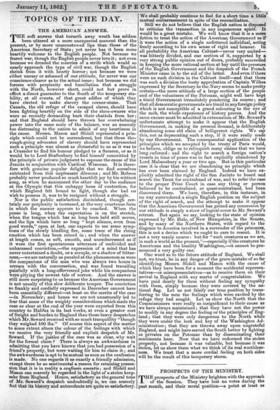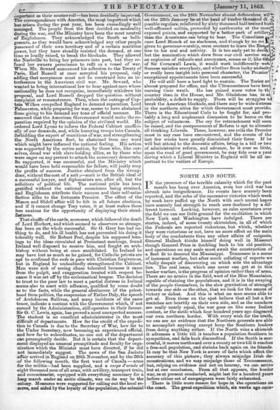PROSPECTS OF THE MINISTRY.
T"prospects of the Ministry brighten with the approach of the Session. They have lost no votes during the past month, and their moral position—a point at least as nportant as their muster roll—has been decidedly improved. The correspondence with America, the most important which has arisen during the past year, has been exceedingly well managed. The people from the first decided on neutrality during the war, and the Ministry have been the most neutral of Englishmen. They acknowledged the South as belli- gerents, as they would have acknowledged any other people possessed of their own territory and of a certain maritime power, but they have steadily resisted the demand, at one time so loudly raised, to break the blockade. They allowed the Nashville to bring her prisoners into port, but they re- fused her owners permission to refit as a vessel of war. When Mr. Seward announced his adhesion to the Treaty of Paris, Earl Russell at once accepted his proposal, only adding that acceptance must not be construed into an in- terference in the American civil war. Mr. Seward, who wanted to bring international law to bear against men whose nationality he does not recognize, immediately withdrew his proposal, and Lord Russell dropped the question without complaint or remonstrance. Then, when the outrage of Cap- tain Wilkes compelled England to demand reparation, Lord 'Palmerston, while preparing for war, seems to have abstained from giving to his demand any tone of official menace. He assumed that the American Government would make the re- paration required by the opinion of the civilized world. He ordered Lord Lyons to inform the Federal Cabinet unoffici- ally of our demands, and, while hurrying troops into Canada, forbidding the export of munitions of war, and strengthening the North American fleet, he abstained from any word which might have inflamed the national feeling. His action was supported by the entire nation, by those who, like our- selves, dread war with slave-holding allies, as by those who were eager on any pretext to attack the unsavoury democrats. So supported, it was successful, and the Ministry which would have been held responsible for failure, will justly reap the profits of success. justice obtained from the wrong- doer, without the cost of a suit ;—such is the British ideal of a successful lavvyer, and diplomatists are, after all, but the solicitors of political life. The national pride has been gratified without the national conscience being strained, and Englishmen attribute their success and their self-satis- faction alike to the fortunate Premier. The effect of the Mason and Slidell affair will be felt in all future elections, and if it cannot change Tory votes, it at least makes them less anxious for the opportunity of displaying their stead- fastness.
That shale of the cards, moreover, which followe,d the death of Lord Herbert, and which seemed to observers so strange, has been on the whole successful. Sir G. Grey has had no- thing to do, and his ill health has not prevented his doing it tolerably well. Sir Robert Peel, despite his supposed lean- ings to the ideas circulated at Protestant meetings, found Ireland well disposed to receive him, and fought an arch- bishop without being at once annihilated. In Ireland he may have lost as much as he gained, for Catholic priests are apt to confound the vade in pace with Christian forgiveness, but in England he undoubtedly streng,thened.the Cabinet. Men were sick of seeing abuse tolerated because it came from the pulpit, and exaggeration treated with respect be- cause it was set off by the ecclesiastical brogue. The decision to trust to the poor law to meet a partial distress in Ireland seems also to meet with adhesion, qualified by some doubt as to the facts, while the general abstinence of the priest- hood from politics, the suspension of Father Daly, the speech of Archdeacon Sullivan, and many incidents of the same tenor, indicate a content with the Government which, if not earned by the Administration, still operates in their favour. Sir G. C. Lewis, again, has proved a most unexpected success. The student is an excellent admininistrator in the most difficult of departments. How far the credit of the expedi- tion to Canada is due to the Secretary of War, how far to the Under Secretary, now becoming an experienced official, and how far to subordinates, no one out of the department can peremptorily decide. But it is certain that the depart- ment displayed an unusual promptitude and faculty for orga- nization which the Minister must have directed, if he did not immediately suggest. The news of the San Jacinto -affair arrived in England on 26th November, and by the 26th -of the following month, the first want of Canada — arms for the militia—had been supplied, and a corps d'armhe of eight thousand men of all arms, with artillery, transport train, and commissariat, equipped with everything necessary for a long march under an arctic climate, was on its way to the colony. Measures were suggested for calling out the local re- serve, and aided by the loyalty of the population, the colonial Government, on the 25th November almost defenceless, wills- on the 25th January- be at the head of twelve thousand di_ t posable regulars, reinforced by sixty thousand half-trained bu well-officered militia, protected by earthworks at the mord ' exposed points, and supported by a better park of artiller3a . than the Americans can bring to bear. The Canadians -of- A-
a
cuse Lord Mona of no slackness, and though by no me given to governor-worship, seem content to leave the Exec, tive to his zeal and activity. It is too early yet to decim. but the nomination which drew from our civil service mil an explosion of ridicule and annoyance, seems as if, like thr of Sir Cornewall Lewis, it would work indifferently we Success satisfies everybody, and whether from lucky audacit or really keen insight into personal character, the Premier' exceptional appointments have been successful.
He will still have a hard fight to sustain. The Tories ar almost prepared for office, and the IT1tramontanes have bee nursing their wrath. He has gained more votes in th country than in the House, and Mr. Gladstone has, in a probability, a deficit to supply. There will be struggles break the American blockade, and there may be wide distress in the northern cities for which Government must provide. There is the Educational Code to be fought for, and pro- bably a long and unpleasant discussion to be borne on the subject of volunteers. The cry for retrenchment will soon be raised, and the postponement of Reform is apt to alienate all thinking Liberals. These, however, are evils the Premier must in any case have encountered, and the events of the last few weeks have greatly diminished their force. If he will but attend to the domestic affairs, bring in a bill or two of administrative reform, and advance, be it ever so little, upon the road of good government, he may tide over a year during which a Liberal Ministry in England will be all im- portant to the welfare of Europe.































 Previous page
Previous page